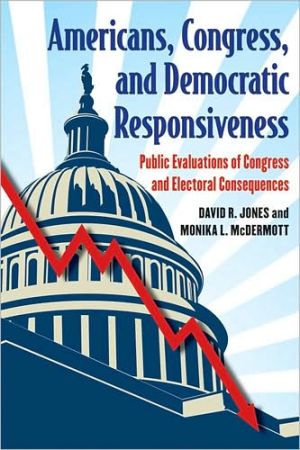Americans, Congress, and Democratic Responsiveness: Public Evaluations of Congress and Electoral Consequences
"Jones and McDermott's groundbreaking book makes a strong case for the proposition that the popular standing of Congress (not merely that of its individual members) influences voters' decisions. Voters enforce collective responsibility, they contend, and Congress takes notice. This will be an important read for all students of Congress and congressional elections."\ ---Gary C. Jacobson, Professor of Political Science, University of California, San Diego\ "Jones and McDermott have set a new...
Search in google:
The public's satisfaction with Congress determines policy shifts as well as turnovers at election time
Americans, Congress, and Democratic Responsiveness\ Public Evaluations of Congress and Electoral Consequences \ \ By David R. Jones Monika L. McDermott \ THE UNIVERSITY OF MICHIGAN PRESS\ Copyright © 2009 University of Michigan\ All right reserved.\ ISBN: 978-0-472-11694-2 \ \ \ Chapter One\ Introduction \ Prior to the 2006 congressional elections, conventional wisdom in political science suggested that the battle for control of the House would be close. Some academic forecasting models predicted that Republicans would hold on to a narrow majority, others that Democrats would gain enough seats to overtake them. Virtually none, however, predicted that Republicans would lose as many as the thirty seats they actually lost, giving the Democrats a majority advantage of thirty-one seats.\ Four years earlier, during the 2002 congressional elections, the American Political Science Association held a symposium of election experts one month before the vote. Every forecasting model presented in the symposium predicted that Democrats would retake majority control of the House from the Republicans. On election day, however, not only did the Democrats not win a majority of seats, but the Republicans actually increased the size of their majority.\ This clear discrepancy between political science theory and political reality is troubling and begs the question, why are these political forecasting models failing so consistently? A close look at both the models and reality points to an obvious shortcoming. Despite the fact that public approval of Congress's performance was near record lows just before the election in 2006 (26 percent in the Gallup Poll) and at record highs just before the election in 2002 (50 percent in the Gallup Poll), not a single academic model of the congressional elections took into account public evaluations of the institution. Instead, these models focused on such factors as presidential approval ratings and the nation's economy.\ If one believes that Americans care not just about the general performance of the president and the economy but also about the performance of Congress specifically, the results of these elections become understandable and even predictable. In 2006, the lowest public approval ratings of congressional performance in twelve years led to greater losses for the House majority party than expected (the greatest losses in twelve years). In 2002, record high approval ratings of Congress's performance helped the House majority to increase its seat margin-rather than decrease it, as predicted.\ Unfortunately, the failure of academics to seriously consider public evaluations of Congress in their 2006 or 2002 forecasts is illustrative of the current state of scholarly thinking in this area. In fact, no standard model of congressional elections has ever included public judgments of congressional performance. Why? Put simply, traditional political science theory and research suggest that Americans do not care much about what policies the collective Congress is pursuing and that even if they did care, Congress and its members are insulated from public judgments of the institution's performance.\ This standard view that neither the public nor the Congress is responsive to the other is quite disturbing from the perspective of normative democratic theory. In the classic model of democratic responsiveness, citizens evaluate governmental institutions on the basis of their policy performance, then government institutions decide their policy behavior in light of public judgments-shifting their policy behavior in response to significant public disapproval and maintaining it when the public approves. According to the conventional scholarly portrait, then, Americans and their Congress fail the basic test of democratic responsiveness. If Americans' attitudes toward Congress have no basis in actual congressional policy behavior and if their evaluations have no electoral effect in any event, then Congress is free to act in any way it sees fit in terms of the policies it formulates and enacts.\ We believe that the conventional academic view underestimates the democratic capabilities of both Americans and their Congress. The purpose of this book is to show that democracy is actually working better-in terms of the public-Congress relationship-than much of the existing scholarship portrays. We demonstrate how Americans use policy direction to evaluate congressional performance, how they use these judgments when voting in congressional elections, and how Congress is ultimately responsive to these judgments of its performance. In making our case, we challenge long-standing assumptions of scholarship on public opinion, elections, and congressional behavior. In the end, we tell a story that is quite different in both its assumptions and its conclusions from current evaluations of American democracy.\ We are not arguing that the traditional factors the literature has found to be significant in explaining public opinion, voting, and congressional behavior are unimportant. Quite the contrary, we believe they are essential to any good explanation of these political phenomena. Nor are we arguing that the factors we choose to focus on are necessarily more important than the factors emphasized in existing research. We do, however, argue that the discipline's traditional explanations of the relationship between the public and Congress are incomplete. Our book seeks to address this gap in an effort to contribute a missing piece to this scholarly puzzle. Before we present our full argument, however, it is important to take a closer look at the existing research.\ PUBLIC EVALUATIONS OF CONGRESS-THE CONVENTIONAL VIEW\ The study of democratic responsiveness is fundamentally about the relationship between the government and the governed. Given the wide scope of this topic, questions about the democratic responsiveness of Americans and Congress necessarily relate to large and disparate bodies of research. Here, we are interested, first, in public opinion research related to the question of how Americans evaluate the performance of political actors generally and Congress in particular. Second, we are interested in behavioral research on how Americans vote in congressional elections and how Congress and its members perceive and react to public evaluations of the institution's performance.\ How Americans Evaluate Congress\ Do Americans respond to congressional policy behavior when evaluating the institution? By and large, the public opinion literature says no. It portrays American citizens as overwhelmingly uninterested and un informed about the policy actions of government (A. Campbell et al. 1960; Converse 1964; Delli Carpini and Keeter 1996; Hibbing and Theiss-Morse 2002; Smith 1989). Looking at the 1956 presidential election, the authors of The American Voter (A. Campbell et al. 1960) famously find that only a small proportion-12 percent-of the electorate spontaneously and knowledgeably evaluated the parties and candidates in terms of their placement on a liberal-conservative policy spectrum. More than four decades later, in their book Stealth Democracy, Hibbing and Theiss-Morse argue that not much has changed: "The people as a whole tend to be quite indifferent to policies and therefore are not eager to hold government accountable for the policies it produces" (2002, 2).\ This characterization of Americans as uninterested and uninformed about policy matters is considered particularly applicable in the case of Congress (Hibbing and Theiss-Morse 1995; Stokes and Miller 1962). In contrast to the single president, the 535-member Congress is seen as an institution too complex for citizens to understand or even consider. Fenno muses, "Most citizens find it hard or impossible to think about Congress as an institution. They answer questions about it; but they cannot conceptualize it as a collectivity" (1978, 245). Congress is also less likely than the president to receive coverage in the national news media (Jamieson 1988). Perhaps as a result, scholars note that the public's ability to answer seemingly simple survey questions about Congress is quite poor. According to Stokes and Miller, "the electorate sees very little altogether of what goes on in the national legislature.... and much of the public is unaware even of which party has control of Congress" (1962, 545). Summarizing the literature, Mondak and his colleagues state that "nothing in the empirical record suggests that citizens are at all well informed regarding the people, politics, and procedures of Congress" (2007, 34).\ If Americans do not think in policy terms and do not have much information about Congress and its policy actions, it becomes difficult to imagine them evaluating Congress on policy or ideological grounds. Indeed, in their important work Congress as Public Enemy, Hibbing and Theiss-Morse find that "policy is rarely mentioned by people when asked about their dislikes of Congress" (1995, 48). Rather than reflecting Americans' concerns with the policy direction of Congress, public evaluations of Congress's job performance are thought to stem mainly from concerns with the style and pace of the legislative process (Hibbing and Theiss-Morse 1995) or from general concerns with national conditions, such as the state of the economy (Durr, Gilmour, and Wolbrecht 1997; Parker 1977; Patterson and Caldeira 1990; Stimson 2004).\ Consequences of Public Judgments of Congress\ Even if Americans' evaluations of Congress were related to policy concerns, the literature does not view public evaluations of Congress as providing any real impetus for responsiveness on the part of Congress (Fenno 1975, 1978; Mayhew 1974; Stokes and Miller 1962). In his seminal work Home Style, Fenno notes that in such a large and diverse body as Congress, "it is easy for each congressman to explain to his own supporters why he cannot be blamed for the performance of the collectivity" (1978, 167). Fenno finds that House members feel so safely insulated from any negative public evaluations of their institution that they often "run for Congress by running against Congress"-actually denigrating the performance of the rest of the institution in their interactions with constituents (168). The notion that congressional evaluations do not affect the fortunes of individual members is supported mainly by a simple yet dramatic observation: despite the fact that a majority of Americans tend to disapprove of the collective Congress, individual members of Congress are regularly reelected at astonishingly high rates-an average of over 90 percent in House elections and only slightly less in Senate elections. That Americans appear to simultaneously "hate Congress" and "love their own member" is so widely known that it is often referred to simply as "Fenno's Paradox" (Fenno 1975; see also Cook 1979; Jones 2003; Mutz and Flemming 1999; Parker and Davidson 1979).\ If incumbents can avoid individual responsibility for congressional performance, might Congress at least be subject to some sort of collective responsibility, with disapproval leading to electoral tides that produce institutional turnover? Mayhew suggests not, noting that "national swings in the congressional vote are normally judgments on what the president is doing ... rather than on what Congress is doing" (1974, 28). Stokes and Miller concur that congressional performance considerations are "unlikely to bring down electoral sanctions" on the majority party (1962, 545). Hibbing and Tiritilli argue that the public generally does not attribute responsibility for Congress's performance to the majority party, so that "most of the time, even when people are quite disapproving of Congress, this disapproval does not have direct electoral repercussions" (2000, 128).\ Even some members of Congress seem to have accepted this conventional wisdom. Former Speaker of the House Thomas "Tip" O'Neill famously declared that "all politics is local." More recently, in the months leading up to the 2006 election, the chairman of the National Republican Congressional Committee, Representative Tom Reynolds, seemed to be (optimistically) channeling Richard Fenno.\ Congress's approval rating is a little flat. My self-esteem wants to see it a little higher. But it is what it is. The most important thing is people love their congressman, no matter what. (Reynolds quoted in Nagourney 2006)\ At the time, prominent political consultants were advising Republicans that gerrymandered districts and a focus on local issues would protect them from any negative electoral effects of low congressional approval.\ Without a threat of electoral defeat when the public disapproves of Congress, there would also appear to be little strategic incentive for members to alter their policy behavior in response to public disapproval of Congress. Indeed, numerous studies find that members exhibit very little ideological change throughout their legislative careers (Carson et al. 2004; Lott and Bronars 1993; Poole and Romer 1993; Poole and Rosenthal 1997; Poole 2007).\ Overall, the view that congressional performance evaluations do not affect Congress and its members is so dominant that few scholars have even thought it necessary to empirically test for such effects. Standard studies of individual voting behavior (e.g., Jacobson 2004), congressional election outcomes (e.g., Tufte 1975), ideological change among individual members (e.g., Poole and Rosenthal 1997), and collective congressional responsiveness (e.g., Erikson, MacKuen, and Stimson 2002) do not consider congressional approval as a possible causal variable.\ REASONS FOR GREATER OPTIMISM\ Despite the impressive weight of scholarly opinion reflected in the preceding discussion, there are important reasons to suspect that both Americans and their Congress are more capable of producing a responsive system than is traditionally argued. Certain politicians, pundits, and even some scholarly studies suggest that citizen capacity for policy-related evaluation of Congress is greater than commonly thought. Additionally, others suggest that members of Congress may not be as insulated from public judgments of their institution as has been traditionally believed.\ Congressional Policy Direction and Congressional Approval\ An initial issue in questioning the conventional wisdom in political science is establishing whether or not Americans actually have enough information about policy matters to effectively evaluate Congress along these lines. The standard academic view, based on survey data, is that they do not. This view has, however, been seriously challenged in other quarters as being far from conclusive (Kuklinski and Quirk 2001).\ One prominent avenue of research suggests that the public has ways of dealing with information shortages. For example, literature on information shortcuts, or heuristics, argues that, in practice, voters mitigate against their relatively low levels of political sophistication by relying on familiar cues to guide them (e.g., Popkin 1991). Other literature shows that political information does regularly reach even politically inattentive citizens indirectly through their social networks-friends, family, and coworkers (Huckfeldt and Sprague 1995).\ In the field of political psychology, research into online, or impression-driven, processing suggests that while Americans may not be able to readily recall specific political information when questioned by survey researchers-thereby scoring poorly on typical knowledge tests-they nevertheless do form general impressions of governmental actors based, at least in part, on such information (e.g., Gant and Davis 1984; Lodge, McGraw, and Stroh 1989; Lodge, Steenbergen, and Brau 1995; Lodge and Stroh 1993). According to this school of thought, individuals regularly come into contact with political information, even if inadvertently, and they absorb the information by updating their impressions of political actors as a result of it. Once they have updated their judgments, individuals have no more use for the specific information and are likely to forget it. In this way, Americans may well base their judgments about governmental actors on factual information-including policy-even if they cannot recall the information itself.\ (Continues...)\ \ \ \ \ Excerpted from Americans, Congress, and Democratic Responsiveness by David R. Jones Monika L. McDermott Copyright © 2009 by University of Michigan . Excerpted by permission.\ All rights reserved. No part of this excerpt may be reproduced or reprinted without permission in writing from the publisher.\ Excerpts are provided by Dial-A-Book Inc. solely for the personal use of visitors to this web site. \ \
Contents Acknowledgments....................ixCHAPTER 1. Introduction....................1CHAPTER 2. Responding to Congressional Policy....................18CHAPTER 3. Failing Pop Quizzes but Passing the Test....................34CHAPTER 4. Evaluating Congress Ideologically....................67CHAPTER 5. Voting the Bums Out....................97CHAPTER 6. Riding the Electoral Wave....................113CHAPTER 7. Responding to Public Evaluations....................128CHAPTER 8. Conclusion....................145CHAPTER 9. The 2008 Congressional Elections: An Afterword....................159Methodological Appendix....................177Notes....................191Bibliography....................203Index....................217








